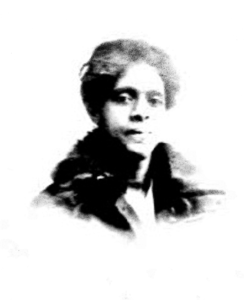
Addie Waites Hunton
*Addie Waites Hunton was born on this date in 1866. She was a Black suffragist, race and gender activist, writer, political organizer, and educator.
Addie D. Waites was born to Jesse and Adeline Waites in Norfolk, Virginia. Her mother died when she was very young, and Addie then moved to Boston to be raised by her maternal aunt. In Boston, Waites attended the Boston Latin School and graduated with a high school diploma. After high school, she attended Spencerian College of Commerce and became their first Black woman graduate in 1889. After graduation, Waites moved to Normal, Alabama, to teach at the State Normal and Agricultural College, now known as the Alabama Agricultural and Mechanical University.
In July 1893, she married William Alphaeus Hunton, who worked in Norfolk, Virginia, to establish YMCA for Negro youth. Hunton worked closely with her husband as his secretary. In 1899, the couple moved to Atlanta, Georgia, where Hunton gave birth to four children, of which only two survived infancy, including Eunice Hunton and William A. Hunton Jr. After seven years in Atlanta, the couple moved to Brooklyn, New York, due to the Atlanta riot of 1906, as they feared for their safety. After moving to New York, Hunton was recognized by the National Board of the YWCA in 1907 and appointed secretary. She was responsible for organizing projects among Black students. Additionally, she traveled through the South and Midwest to survey the YWCA.
Hunton is well known for her social welfare efforts among the Black community. Furthermore, she recruited several other Black women to work for the YWCA, such as Eva del Vakia Bowles and Elizabeth Ross Haynes. From 1909 to 1910, Hunton moved with her children to Europe. Her husband suffered from health issues and remained home in the U.S. While in Europe, Hunton lived in Switzerland and then moved to Strasbourg, Germany, where she studied part-time at Kaiser Wilhelm University.
When Hunton and her children moved back to America, she continued to work with the YWCA and also began to take courses at the College of the City of New York. At this time, her husband, William, was in a critical state with tuberculosis. From 1909 to 1910, Hunton took her children to study at the Kaiser Wilhelm University in Strasbourg, France, after which she enrolled in courses at the College of the City of New York. Hunton family then moved to Saranac Lake, New York, where they stayed until her husband’s death in 1916.
In 1917, during World War I. Hunton quickly became involved through the YMCA, and in June 1918, she set sail for France as one of three Black women, the others being Kathryn Johnson and Helen Curtis. They were assigned to work with the 200,000 segregated Black troops stationed in France. Hunton soon became exposed to the racism against African American soldiers. She saw efforts by the American Command to regulate the lives of Black soldiers, recreating a system reminiscent of Jim Crow. Hunton began working in the services and supplies sector at Saint Nazaire. She introduced many new programs to increase the quality of the soldiers' lives, including a literacy course and a discussion series on art, music, religion, and other topics. Of Hunton's many wartime efforts, a particularly gruesome assignment was given to her in May 1919.
She was sent to a military cemetery and was ordered to oversee and comfort black soldiers who were assigned to recover the dead from the battlefield of the Meuse-Argonne and rebury them. Hunton and Kathryn Johnson wrote a book documenting their experience of wartime tragedies and race relations within American forces, titled Two Colored Women with the American Expeditionary Forces, published in 1920. She published a book about her husband's life and work entitled William Alphaeus Hunton, A Pioneer Prophet of Young Men, in 1938. She was a regular participant in the work of the Equal Suffrage League.
Hunton was known for her commitment to peace, race relations, and empowering the Black community, especially women. She created a three-part peace strategy. First, she encouraged African American women to create an international organization. Second, Hunton believed that African American women should get involved in the Pan-African movement, which was predominantly male-dominated at that point. Finally, she aimed to involve African American women in the mainly white U.S. movement for peace. Addie Waites Hunton died in Brooklyn on June 21, 1943, having dedicated her life to issues of racial and gender equality.